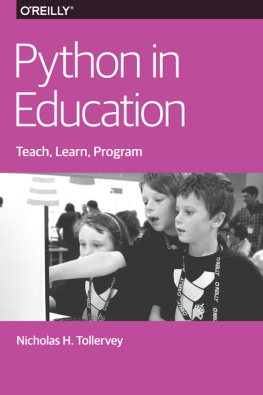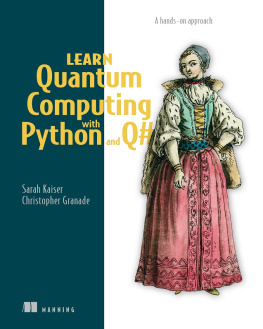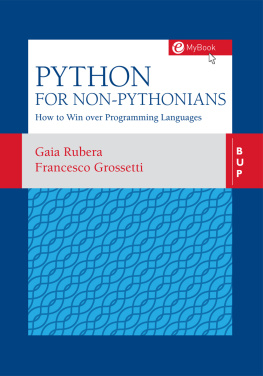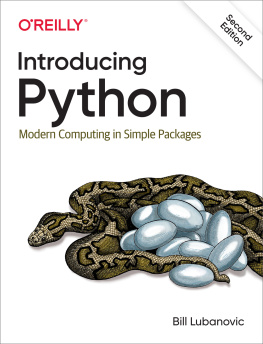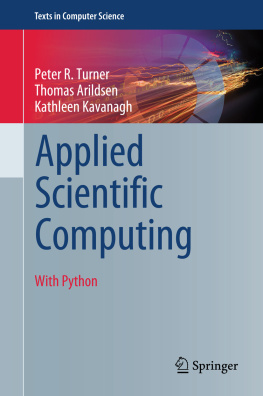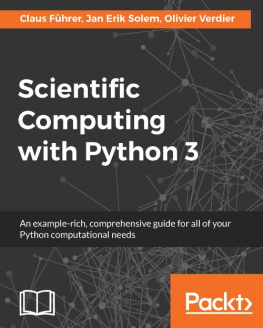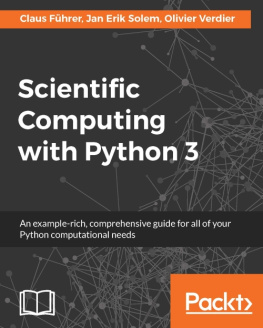Francesco Pierfederici - Distributed Computing with Python
Here you can read online Francesco Pierfederici - Distributed Computing with Python full text of the book (entire story) in english for free. Download pdf and epub, get meaning, cover and reviews about this ebook. year: 2016, publisher: Packt Publishing, genre: Computer. Description of the work, (preface) as well as reviews are available. Best literature library LitArk.com created for fans of good reading and offers a wide selection of genres:
Romance novel
Science fiction
Adventure
Detective
Science
History
Home and family
Prose
Art
Politics
Computer
Non-fiction
Religion
Business
Children
Humor
Choose a favorite category and find really read worthwhile books. Enjoy immersion in the world of imagination, feel the emotions of the characters or learn something new for yourself, make an fascinating discovery.

- Book:Distributed Computing with Python
- Author:
- Publisher:Packt Publishing
- Genre:
- Year:2016
- Rating:4 / 5
- Favourites:Add to favourites
- Your mark:
- 80
- 1
- 2
- 3
- 4
- 5
Distributed Computing with Python: summary, description and annotation
We offer to read an annotation, description, summary or preface (depends on what the author of the book "Distributed Computing with Python" wrote himself). If you haven't found the necessary information about the book — write in the comments, we will try to find it.
Distributed Computing with Python — read online for free the complete book (whole text) full work
Below is the text of the book, divided by pages. System saving the place of the last page read, allows you to conveniently read the book "Distributed Computing with Python" online for free, without having to search again every time where you left off. Put a bookmark, and you can go to the page where you finished reading at any time.
Font size:
Interval:
Bookmark:
Copyright 2016 Packt Publishing
All rights reserved. No part of this book may be reproduced, stored in a retrieval system, or transmitted in any form or by any means, without the prior written permission of the publisher, except in the case of brief quotations embedded in critical articles or reviews.
Every effort has been made in the preparation of this book to ensure the accuracy of the information presented. However, the information contained in this book is sold without warranty, either express or implied. Neither the author, nor Packt Publishing, and its dealers and distributors will be held liable for any damages caused or alleged to be caused directly or indirectly by this book.
Packt Publishing has endeavored to provide trademark information about all of the companies and products mentioned in this book by the appropriate use of capitals. However, Packt Publishing cannot guarantee the accuracy of this information.
First published: April 2016
Production reference: 1060416
Published by Packt Publishing Ltd.
Livery Place
35 Livery Street
Birmingham B3 2PB, UK.
ISBN 978-1-78588-969-1
www.packtpub.com
Author
Francesco Pierfederici
Reviewer
James King
Commissioning Editor
Veena Pagare
Acquisition Editor
Aaron Lazar
Content Development Editor
Parshva Sheth
Technical Editor
Abhishek R. Kotian
Copy Editor
Neha Vyas
Project Coordinator
Nikhil Nair
Proofreader
Safis Editing
Indexer
Rekha Nair
Graphics
Disha Haria
Production Coordinator
Melwyn Dsa
Cover Work
Melwyn Dsa
Francesco Pierfederici is a software engineer who loves Python. He has been working in the fields of astronomy, biology, and numerical weather forecasting for the last 20 years.
He has built large distributed systems that make use of tens of thousands of cores at a time and run on some of the fastest supercomputers in the world. He has also written a lot of applications of dubious usefulness but that are great fun. Mostly, he just likes to build things.
I would like to thank my wife, Alicia, for her unreasonable patience during the gestation of this book. I would also like to thank Parshva Sheth and Aaron Lazar at Packt Publishing and the technical reviewer, James King, who were all instrumental in making this a better book.
James King is a software developer with a broad range of experience in distributed systems. He is a contributor to many open source projects including OpenStack and Mozilla Firefox. He enjoys mathematics, horsing around with his kids, games, and art.
Did you know that Packt offers eBook versions of every book published, with PDF and ePub files available? You can upgrade to the eBook version at > for more details.
At www.PacktPub.com, you can also read a collection of free technical articles, sign up for a range of free newsletters and receive exclusive discounts and offers on Packt books and eBooks.

https://www2.packtpub.com/books/subscription/packtlib
Do you need instant solutions to your IT questions? PacktLib is Packt's online digital book library. Here, you can search, access, and read Packt's entire library of books.
- Fully searchable across every book published by Packt
- Copy and paste, print, and bookmark content
- On demand and accessible via a web browser
Parallel and distributed computing is a fascinating subject that only a few years ago developers in only a very few large companies and national labs were privy to. Things have changed dramatically in the last decade or so, and now everybody can build small- and medium-scale distributed applications in a variety of programming languages including, of course, our favorite one: Python.
This book is a very practical guide for Python programmers who are starting to build their own distributed systems. It starts off by illustrating the bare minimum theoretical concepts needed to understand parallel and distributed computing in order to lay the basic foundations required for the rest of the (more practical) chapters.
It then looks at some first examples of parallelism using nothing more than modules from the Python standard library. The next step is to move beyond the confines of a single computer and start using more and more nodes. This is accomplished using a number of third-party libraries, including Celery and Pyro.
The remaining chapters investigate a few deployment options for our distributed applications. The cloud and classic High Performance Computing (HPC) clusters, together with their strengths and challenges, take center stage.
Finally, the thorny issues of monitoring, logging, profiling, and debugging are touched upon.
All in all, this is very much a hands-on book, teaching you how to use some of the most common frameworks and methodologies to build parallel and distributed systems in Python.
, AnIntroduction to Parallel and Distributed Computing , takes you through the basic theoretical foundations of parallel and distributed computing.
, Asynchronous Programming , describes the two main programming styles used in distributed applications: synchronous and asynchronous programming.
, Parallelism in Python , shows you how to do more than one thing at the same time in your Python code, using nothing more than the Python standard library.
, Distributed Applications with Celery , teaches you how to build simple distributed applications using Celery and some of its competitors: Python-RQ and Pyro.
, Python in the Cloud , shows how you can deploy your Python applications on the cloud using Amazon Web Services.
, Python on an HPC Cluster , shows how to deploy your Python applications on a classic HPC cluster, typical of many universities and national labs.
, Testing and Debugging Distributed Applications , talks about the challenges of testing, profiling, and debugging distributed applications in Python.
, The Road Ahead , looks at what you have learned so far and which directions interested readers could take to push their development of distributed systems further.
The following software and hardware is recommended:
- Python 3.5 or later
- A laptop or desktop computer running Linux or Mac OS X
- Ideally, some extra computers or some extra virtual machines to test your distributed applications
All software mentioned in this book is free of charge and can be downloaded from the Internet with the exception of PBS Pro, which is commercial. Most of the PBS Pro functionality, however, is available in its close sibling Torque, which is open source.
Font size:
Interval:
Bookmark:
Similar books «Distributed Computing with Python»
Look at similar books to Distributed Computing with Python. We have selected literature similar in name and meaning in the hope of providing readers with more options to find new, interesting, not yet read works.
Discussion, reviews of the book Distributed Computing with Python and just readers' own opinions. Leave your comments, write what you think about the work, its meaning or the main characters. Specify what exactly you liked and what you didn't like, and why you think so.

